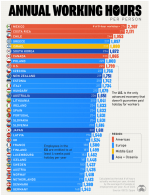2 things: 1) They are good for comparative because whatever the calc, it's the same one for each country and 2) I don't think that we are missing anything the note in the article indicates that it is part and full time that make up the "per person".
I don't know. I think dividing it by the number of people in employment means that the number could be greatly impacted by how public benefits are structured. I am guessing we have more people that show up as nominally in the work force barely working hours because we have relatively work requirements for welfare than other countries, so could that be driving our average down?
I also think the method for gathering data is likely going to be inconsistent across countries. How are they estimating hours worked by salaried workers? If they are just asking workers, I could easily see there being cultural differences that impact self-reporting. Are there cultures that pride being workaholics that would tend to claim more hours? Are there just different customers regarding how hours are accounted for? I think a lot of salaried workers in the US would say they work 40 hours a week, even though they in reality work closer to 45, because they are expected to more or less clock in and clock out like hourly workers, and by the time you throw in some cushion on the beginning and end of work and on any lunch break. But I've also heard people talk about working 60 hours a week and they just mean time away from home, including the commute and lunch break. Are there countries that tend to report working hours like that?
If you're not just asking workers, where would you get the data? I can't imagine there is good data on that that is consistent across countries?
And I don't know if I've just always been around people prejudiced against Greece and/or Greek people, but I have never heard anything that would make me put them at the top of EU countries as far as hard working, much less ahead of South Koreans. Is everybody around me secretly a, I don't know what to call them, anti-helenists unfairly maligning the Greeks as layabouts?


